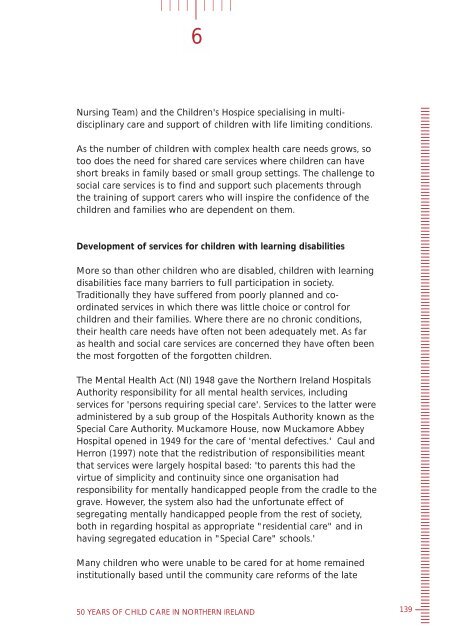childcare-50years
childcare-50years
childcare-50years
You also want an ePaper? Increase the reach of your titles
YUMPU automatically turns print PDFs into web optimized ePapers that Google loves.
6<br />
Nursing Team) and the Children's Hospice specialising in multidisciplinary<br />
care and support of children with life limiting conditions.<br />
As the number of children with complex health care needs grows, so<br />
too does the need for shared care services where children can have<br />
short breaks in family based or small group settings. The challenge to<br />
social care services is to find and support such placements through<br />
the training of support carers who will inspire the confidence of the<br />
children and families who are dependent on them.<br />
Development of services for children with learning disabilities<br />
More so than other children who are disabled, children with learning<br />
disabilities face many barriers to full participation in society.<br />
Traditionally they have suffered from poorly planned and coordinated<br />
services in which there was little choice or control for<br />
children and their families. Where there are no chronic conditions,<br />
their health care needs have often not been adequately met. As far<br />
as health and social care services are concerned they have often been<br />
the most forgotten of the forgotten children.<br />
The Mental Health Act (NI) 1948 gave the Northern Ireland Hospitals<br />
Authority responsibility for all mental health services, including<br />
services for 'persons requiring special care'. Services to the latter were<br />
administered by a sub group of the Hospitals Authority known as the<br />
Special Care Authority. Muckamore House, now Muckamore Abbey<br />
Hospital opened in 1949 for the care of 'mental defectives.' Caul and<br />
Herron (1997) note that the redistribution of responsibilities meant<br />
that services were largely hospital based: 'to parents this had the<br />
virtue of simplicity and continuity since one organisation had<br />
responsibility for mentally handicapped people from the cradle to the<br />
grave. However, the system also had the unfortunate effect of<br />
segregating mentally handicapped people from the rest of society,<br />
both in regarding hospital as appropriate "residential care" and in<br />
having segregated education in "Special Care" schools.'<br />
Many children who were unable to be cared for at home remained<br />
institutionally based until the community care reforms of the late<br />
50 YEARS OF CHILD CARE IN NORTHERN IRELAND<br />
139


